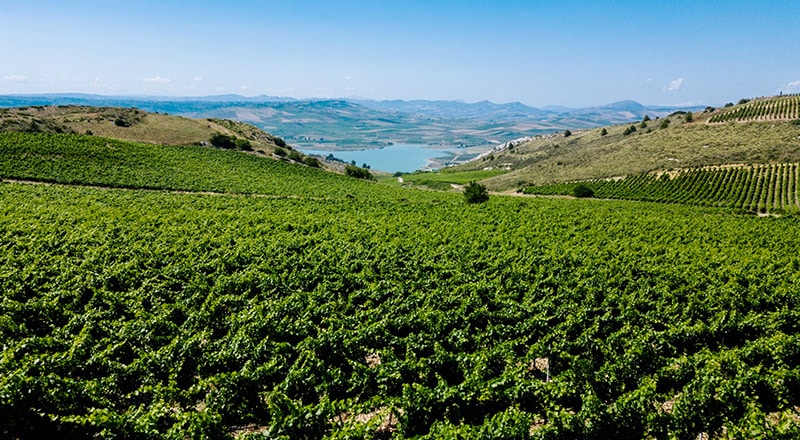About Planeta
Planeta represents the history of a Sicilian family and its agricultural operation, a family that, for almost five centuries now and 17 generations, has committed itself to preserving, protecting, and developing its unique corner of the earth, with an approach continuously prioritizing agricultural innovation. With its viticulture and olive-growing activities and an advanced business philosophy, the Planeta family has been successful in positively impacting the environment and its local community, embodying a modern Sicily proudly aware of its history, in dialogue with the world through unique products and projects.
In the 1960s, Vito Planeta left his modest wine cellar to establish and direct a large cooperative, which over time became an important community asset as well as a model of growth for the entire district. 1985 saw the emergence of a new winery, under the direction of his son Diego, with the planting of a new vineyard next to the fortress at Ulmo: 50 hectares of vines that constituted a laboratory for experimenting with micro-vinifications. As President of the Regional Institute of Vine and Wine from 1985 to 1992, a Knight of Labour and a member of the Georgofili Academy, and with an Honorary Degree in Agricultural Sciences and Technologies from the University of Palermo, Diego Planeta completely revolutionized the Sicilian wine industry, bringing to the island world-famous agronomists, oenologists and scientists and providing its winegrowing sector with an invaluable wealth of data and market research, plus a far-ranging, strategic vision. In the late 1980s and early 1990s, he decided to launch a family winery and entrust it to the next generation.
The first wines, released in 1995, were made from both native and international grape varieties, including Chardonnay, a distinctive interpretation that has won many awards. That portfolio brought world—and Sicilian–attention to the new-born Planeta and its use of non-native grapes, signaling a commitment to diversification that is now a distinctive feature of the Planeta Group. Diego Planeta ceased his work in agriculture only upon his death on 19 September 2020. One year later, the Consortium for the Protection of Sicily DOC Wines, together with University of Palermo and the University Museum System, named after him the “Vigna del Gallo-Diego Planeta” as a tribute to this great figure and his contribution to winemaking innovation on his beloved island. Located in Palermo in one of Italy’s most beautiful botanical gardens, the vineyard is a remarkable display of the enormous diversity within the Sicilian wine universe, since it boasts a total of 95 biotypes of the region’s native grapes. Today, the winery is directed by CEO Alessio Planeta, assisted by Francesca, Vito, Santi, and a staff of 270.
Planeta plays a major role in the world of Sicilian wine, with 386 hectares of vineyards and 2.4 million bottles of wine produced in seven winemaking facilities located within five different growing areas (Menfi, Vittoria, Noto, Mount Etna and Capo Milazzo), as well as 151 hectares of olive groves and 5 hospitality and wine tour complexes. Its business philosophy, with its core orientation towards sustainability, regards the agricultural world as the most complete expression of the generosity and beauty of nature, of a complex environment enhanced by a profound mastery of cultivation practices and protective of a biodiversity handed down for centuries. All of this is synthesized in the Planeta Terra protocols, a set of agronomic and vineyard management practices focusing on protecting the ecosystem and promoting a holistic concept of agriculture. The history and values of this great Sicilian family are today represented by 15 members who, continuing on the path first traced by their uncle Diego and grandfather Vito, continue to grow and evolve their heritage through a continuous “Viaggio in Sicilia”, a physical and metaphorical “Journey in Sicily” that explores the natural and cultural riches of the region.



Planeta is a Journey in Sicily: wine, oil and hospitality through six territories of the Island.